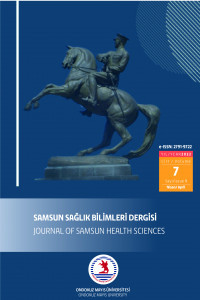Covid-19 Pandemisinin Hemşire Akademisyenlerin Sosyal ve Akademik Yaşamları Üzerine Etkileri
Covid-19, academic impact, Akademisyen, Sosyal etkilenim, Akademik etkilenim
THE EFFECTS OF COVID-19 PANDEMIC ON SOCIAL AND ACADEMIC LIVES OF NURSE ACADEMICIANS
COVID-19, Academician, Social impact, Academic impact,
___
- American Nursing Association. Nurse Education Workshops. 2020. Retrieved from: https://www.nursingworld.org/organizational-programs/pathway/resources/education/. Accessed date: July 2020.
- Brynjolfsson, E., Horton, J.J., Ozimek, A., Rock, D., Sharma, G., TuYe, H.Y. (2020). Covid-19 and remote work: An early look at us data (No. w27344). National Bureau of Economic Research.
- Burk, B.N., Pechenik Mausolf, A., Oakleaf, L. (2020). Pandemic Motherhood and the Academy: A Critical Examination of the Leisure-Work Dichotomy. Leisure Sciences, 1-7.
- Centers for Disease Control and Prevention. (2020). Coronavirus Disease 2019 (COVID- 19). Retrieved from: https://www.cdc.gov/coronavirus/2019-ncov/symptoms-testing/symptoms.html. Erişim Tarihi: 30.06.2020.
- Göktepe, E.A. (2020). A Phenomenological Research to Determine Individuals' Perception of Distance (Work From Home) Model in Pandemic Period; Public University Example. Journal of Current Researches on Business and Economics, 10 (1), 29-42.
- Frontiers. (2020). Coronavirus Funding Monitor. Retrieved from: https://coronavirus.frontiersin.org/covid-19-research-funding-monitor. Accessed date: July 2020.
- Hora, D. (2020). Scientific progress and the COVID-19 pandemic. Retrieved from: https://medium.com/researchgate/scientific-progress-and-the-covid-19-pandemic-b685ba79640. Accessed date: July 2020.
- Kurnaz, E., Serçemeli, M. (2020). Covıd-19 Pandemi Döneminde Akademisyenlerin Uzaktan Eğitim ve Uzaktan Muhasebe Eğitimine Yönelik Bakış Açıları Üzerine Bir Araştırma. Uluslararası Sosyal Bilimler Akademi Dergisi (3), 262-288.
- Lai CC, Shih TP, Ko WC, Tang HJ, Hsueh PR. (2020). Severe acute respiratory syndrome coronavirus 2 (SARS-CoV-2) and coronavirus disease-2019 (COVID-19): The epidemic and the challenges. Int J Antimicrob Agents, 55 (3):105924. doi: 10.1016/j.ijantimicag.2020.105924.
- Li, Q., Guan, X., Wu, P., Wang, X., Zhou, L., Tong, et al.(2020). Early Transmission Dynamics in Wuhan, China, of Novel Coronavirus–Infected Pneumonia. N Engl J Med,382(13):1199-1207. doi: 10.1056/NEJMoa2001316.
- Nursing meetings. (2020). Nursing Research Congress, 2020. Retrieved from: https://euronursing.nursingmeetings.com. Accessed date: July 2020.
- ODTU Library. (2020). Free Access During the Coronavirus (Covid-19) Pandemic. Retrieved from: https://lib.metu.edu.tr/announcements/free-access-during-coronavirus-covid-19-pandemic. Accessed date: July 2020.
- Rothan, H.A., Byrareddy, S.N. (2020). The epidemiology and pathogenesis of coronavirus disease (COVID-19) outbreak. Journal of autoimmunity, 102433. doi: https://doi.org/10.1016/j.jaut.2020.102433.
- Researchgate. (2020). Covıd-19 Impact On Global Scıentıfıc Communıty. https://www.researchgate.net/institution/ResearchGate/post/5e81f09ad785cf1ab1562183_Report_COVID-19_impact_on_global_scientific_community. Accessed date: July 2020.
- Sethi, B.A., Sethi, A., Ali, S., Aamir, H.S. (2020). Impact of Coronavirus disease (COVID-19) pandemic on health professionals. Pakistan Journal of Medical Sciences, 36 (COVID19-S4). doi: https://doi.org/10.12669/pjms.36.COVID19-S4.2779
- STAT. (2020). Coronavirus pandemic forces some research labs to shut down, with uncertain futures for scientific projects. Retrieved from: https://www.statnews.com/2020/03/14/coronavirus-pandemic-forces-research-labs-shut-down/. Accessed date: July 2020.
- Turkey Republic Health Ministry. (2020). Türkiye Günlük Koronavirüs Tablosu. Retrieved from: https://covid19.saglik.gov.tr/. Accessed date: 30.06.2020.
- Turkey Republic Higher Education Board. (2020). Pandemi Günlerinde Türk Yükseköğretimi Retrieved from: https://covid19.yok.gov.tr/Sayfalar/HaberDuyuru/pandemi-gunlerinde-turk-yuksekogretimi.aspx. Accessed date: 30.06.2020.
- Turkey Republic Higher Education Board. (2020). Bölüm bazında öğretim elemanı sayıları raporu. Retrieved from: https://istatistik.yok.gov.tr/
- University of Oxford. (2020). Research Support, Ethics committee contacts. Retrieved from: https://researchsupport.admin.ox.ac.uk/governance/ethics/contacts. Accessed date: July 2020.
- Wattis, L., Standing, K., Yerkes, M. A. (2013). Mothers and work–life balance: Exploring the contradictions and complexities involved in work–family negotiation. Community, Work & Family, 16(1), 1-19.
- World Health Organization. (2020). Coronavirus. Retrieved from: https://www.who.int/health-topics/coronavirus#tab=tab_1 Accessed date: 30.06.2020.
- World Health Organization, Coronavirus disease (COVID-19) pandemic. (2020). Retrieved from:https://www.who.int/emergencies/diseases/novel-coronavirus-2019. Accessed date: 30.06.2020.
- Yayın Aralığı: Yılda 3 Sayı
- Başlangıç: 2021
- Yayıncı: Ondokuz Mayıs Üniversitesi
TÜRKİYE’DE GEBELİKTE ŞİDDET DURUMUYLA İLGİLİ YAYINLANAN MAKALELERİN İÇERİK ANALİZİ: 2010-2020
Funda ÇİTİL CANBAY, Elif Tuğçe ÇİTİL
KADIN KONUKEVİNDE YAŞAYAN KADINLARIN GENİTAL HİJYEN DAVRANIŞLARI: MANİSA İLİ ÖRNEĞİ
Burçak TORAMAN, Selda İLDAN ÇALIM, Seda BİÇİCİ
PSİKİYATRİK SOSYAL HİZMET AMAÇLARI-ROLLERİ-SORUMLULUKLARI
Ruşen AYATA KÜÇÜKBÜKÜCÜ, Gülsüm ÇAMUR
EBELİK ÖĞRENCİLERİNİN KİŞİLİK ÖZELLİKLERİ VE YAŞAM BOYU ÖĞRENME EĞİLİMLERİ ARASINDAKİ İLİŞKİ
Tuğba Enise BENLİ, Emine İBİCİ AKÇA, Yeşim AKSOY DERYA
GÖĞÜS CERRAHİSİNDE HIZLANDIRILMIŞ İYİLEŞME PROTOKOLÜ VE HEMŞİRENİN ROLÜ
Koronavirüs Pandemisinde Sağlık Bilimleri Alanında Çalışan Akademisyenlerin Uykusuzluk Şiddeti
Serap ÖZTÜRK ALTINAYAK, Tülay YILMAZ BİNGÖL, Zümrüt YILAR ERKEK
GEBE KADINLARIN PELVİK TABAN KAS EGZERSİZLERİ HAKKINDA BİLGİ VE İNANÇLARI
Hatice KAHYAOĞLU SÜT, Burcu KÜÇÜKKAYA
Çiğdem KARAKAYALI AY, Tuğba Enise BENLİ
İşyeri Emzirme Desteği Ölçeğinin Türkçe Uyarlaması: Geçerlik ve Güvenirlik Çalışması
